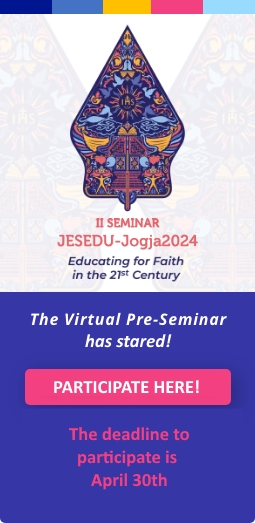The tradition of Ignatius provides a foundational dimension to the spirituality of the contemporary Church. In examining aspects of this spirituality, we can allow our ‘kinship’ with the Earth and all of creation to inform our encounter with the Incarnate Christ. Ignatian spirituality demands a critical awareness of the environment in our daily lives, moving us from a sense of mere stewardship of the Earth to a deeper covenant of membership in the order of creation. This view is not merely instrumental but sacramental: the very relational quality of God as actualized in creation. This perspective recognizes that we are engaged in a relationship with the Incarnate God, and must therefore see ourselves as kin with all creation, both biologically and spiritually. This point of view demands an ecological conversion by which we address the current environmental crisis with a fresh recognition of our kinship with all creation. This newfound communion enables us to overcome abstraction and know the bonds of Heaven to Earth, of Spirit to Matter.
Any contemporary theology that claims to address the ecological crisis will need to be a theology that understands the human person as part of the natural world. My assertion is that Christians have a particular role in the environmental movement because of our understanding of both the Incarnation and communion. A communal theology, which takes seriously the incarnational grounding of our human identity, transforms humanity’s relationship to the natural world and inspires an enriched approach to the ecological movement. Ignatian Spirituality offers a unique point of entry into ecological spirituality and thus the restoration of creation. When the great themes of Christian theology, such as covenant and incarnation, are brought to our contemporary understanding of ecology with an attitude that is critical yet respects the beauty and depth of both disciplines, they raise our ecological vision from one of mere materialism to one of reconciliation, re-creation, and ultimately resurrection. What follows is a very brief consideration of the topic. I do not pretend to offer a full realization of what will come from this meeting of Ignatian Spirituality and an ecological imagination, but I hope to offer two initial steps.
The daily examen and Ignatian imaginative prayer are two clear ways to cultivate an ecological sensitivity in one’s interior life. We are well aware that God continually draws each one of us to Himself in and through Christ. We experience God’s action in our feelings, moods, actions and desires. We believe that God reveals Himself in our feelings as much as He does in our clear and distinct ideas. Allowing God to draw us more intimately, we must first let Him draw us at the core of our being, which means becoming more aware of our feelings. Here we recognize God’s ceaseless invitation to come closer, to be more like God, to be one with God. Additionally, we become conscious of our resistance to God, which arises from sin in ourselves and in the world about us. Using the technique of the examen with an ecological lens allows us to reflect prayerfully on the events of the day. We are able to witness our relationship with creation, and to detect God’s presence and discern God’s direction for us. The goal of the examen is a discerning heart. The purpose of the Ecological Examen is discerning how God is inviting us individually to see how we are responding with greater sensitivity.
The five movements in the Ecological Examen parallel the traditional examen. We begin with thanksgiving and gratitude for the covenant God offers in the gift of God’s self in all creation. Second, we specifically request to have our eyes opened by the Spirit as to how we might care for creation. Third, we review the challenges and joy experienced in this care. Asking God: “How was I drawn into God today through creation?” How were we being invited to respond to God’s action in creation? Is there some part of our relationship with creation that is in need of change? Fourth, asking for a true and clear awareness of our sinfulness, whether it be a sense of superiority or a failure to respond to the needs of creation. Finally, hope. We ask for hope in the future, asking for greater sensitivity to trust in God’s living presence in all creation.
Ecological Examen by: Joseph Carver, SJ
All creation reflects the beauty and blessing of God’s image. Where
was I most aware of this today?
Can I identify and pin-point how I made a conscious effort to care
for God’s creation during this day?
What challenges or joys do I experience as I recall my care for
creation?
How can I repair breaks in my relationship with creation, in my
unspoken sense of superiority?
As I imagine tomorrow, I ask for the grace to see the Incarnate
Christ in the dynamic interconnections of all Creation.
Conclude with the prayer of Jesus:
The glory that you have given me I have given them, so that they
may be one, as we are one, I in them and you in me, that they may
become completely one, so that the world may know that you have
sent me and have loved them even as you have loved me. (Jn 17:22-23)
The examen, like the Spiritual Exercises, progresses to the point of exhorting us to a total commitment to the life of Christ. Inspired by the Spirit, looking at the events in our lives and on the earth from an ecological perspectives moves us to deepen our commitments, returning to daily life with enthusiasm, inspired to transform, heal and recover the natural environment. In my experience the practice of the Ecological Examen has led to profound experiences of gratitude, for the gifts of creation most especially. This examen teaches us our ultimate purpose “to praise, reverence and serve God” in such a way that a Christian environmental response is part and parcel of everything we do. The goal is therefore to make this response part of our service to each other, to our communities, and to all creation. Like the traditional examen, the Ecological Examen leads us to three steps: awareness, appreciation and commitment. Awareness involves taking off our societal blinders that keep us focused on our own pursuits. From awareness comes appreciation; we cannot appreciate what we are unaware of, or not in relationship with. Appreciation leads to respect and love; all creation has value because God made it thus. In this way we learn to appreciate those things we would only previously tolerate, and treat as objects; now we begin to see and learn of their critical importance to the rest of the community of creation. Suddenly we find we are imitating the dung beetle in our kitchen composting, and building turbines that mimic the flippers of humpback whales. Creation becomes an indispensible teacher rather than an intolerable scavenger. Finally, appreciation leads us to committed action. We move beyond reuse and recycling, beyond stewardship, to restoration and renewal.
To read the full article, please click here.

